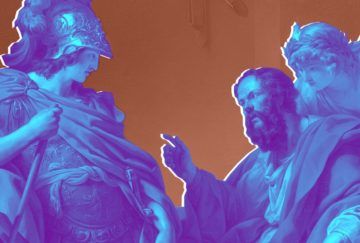Agnes Callard in Boston Review:
 Philosophers aren’t the only ones who love wisdom. Everyone, philosopher or not, loves her own wisdom: the wisdom she has or takes herself to have. What distinguishes the philosopher is loving the wisdom she doesn’t have. Philosophy is, therefore, a form of humility: being aware that you lack what is of supreme importance. There may be no human being who exemplified this form of humility more perfectly than Socrates. It is no coincidence that he is considered the first philosopher within the Western canon.
Philosophers aren’t the only ones who love wisdom. Everyone, philosopher or not, loves her own wisdom: the wisdom she has or takes herself to have. What distinguishes the philosopher is loving the wisdom she doesn’t have. Philosophy is, therefore, a form of humility: being aware that you lack what is of supreme importance. There may be no human being who exemplified this form of humility more perfectly than Socrates. It is no coincidence that he is considered the first philosopher within the Western canon.
Socrates did not write philosophy; he simply went around talking to people. But these conversations were so transformative that Plato devoted his life to writing dialogues that represent Socrates in conversation. These dialogues are not transcripts of actual conversations, but they are nonetheless clearly intended to reflect not only Socrates’s ideas but his personality. Plato wanted the world to remember Socrates. Generations after Socrates’s death, warring philosophical schools such as the Stoics and the Skeptics each appropriated Socrates as figurehead. Though they disagreed on just about every point of doctrine, they were clear that in order to count themselves as philosophers they had to somehow be working in the tradition of Socrates.
What is it about Socrates that made him into a symbol for the whole institution of philosophy? Consider the fact that, when the Oracle at Delphi proclaims Socrates wisest of men, he tries to prove it wrong. As Plato recounts it in the Apology:
I went to one of those reputed wise, thinking that there, if anywhere, I could refute the oracle and say to it: “This man is wiser than I, but you said I was.” Then, when I examined this man—there is no need for me to tell you his name, he was one of our public men—my experience was something like this: I thought that he appeared wise to many people and especially to himself, but he was not. I then tried to show him that he thought himself wise, but that he was not. As a result he came to dislike me, and so did many of the bystanders. So I withdrew and thought to myself: “I am wiser than this man; it is likely that neither of us knows anything worthwhile, but he thinks he knows something when he does not, whereas when I do not know, neither do I think I know; so I am likely to be wiser than he to this small extent, that I do not think I know what I do not know.”
If Socrates’s trademark claim is this protestation of ignorance, his trademark activity is the one also described in this passage: refuting the views of others.
More here.
